- Share via
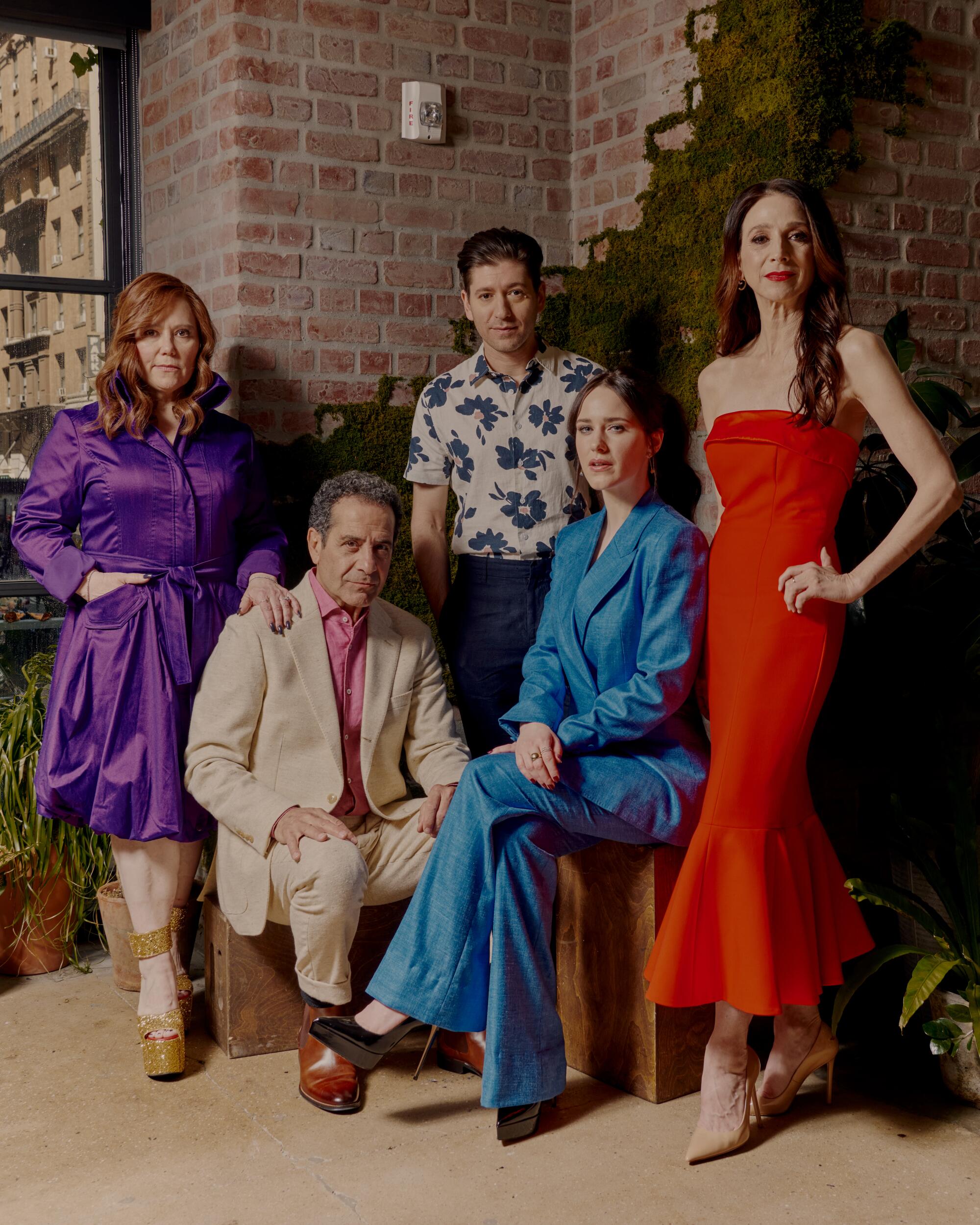
By the time Miriam Maisel decided to pursue a career as a stand-up comedian, she was already a full-grown person by the standards of her time, with a clearly defined identity as a wife, mother and daughter. But Rachel Brosnahan, who has portrayed that fictional entertainer on five seasons of “The Marvelous Mrs. Maisel,” the period comedy-drama on Prime Video, says she became the person she is today while playing that role.
“I literally grew up on this show,” Brosnahan says, speaking in a roundtable conversation with her “Mrs. Maisel” co-stars in mid-April. “I started this when I was 26. We’ve all had so much life happen while we’ve been together. And so we’re a part of each other’s experience in and outside of the show.”
For now that experience is over: The latest season of “Mrs. Maisel,” which offered a highly stylized, fast-paced look at the changing cultural mores of the 1950s and ‘60s, is its last. At its launch in 2017, the series made a star of Brosnahan (then better known for supporting roles on such shows as “House of Cards”).
“Mrs. Maisel” also helped reintroduce and reinvent familiar cast members like Michael Zegen (“Boardwalk Empire”), who played Miriam’s on-again, off-again husband, Joel; Tony Shalhoub (“Monk”) and Marin Hinkle (“Two and a Half Men”), who played her doting parents, Abe and Rose; and Alex Borstein (“Family Guy”), who played her irascible manager, Susie.
As they say goodbye to “The Marvelous Mrs. Maisel,” these actors reflect on the show’s earliest days, the far-flung locations it took them to, and the genius of its creator, Amy Sherman-Palladino.
Naturally, the farewell process stirred up a mixture of grief and relief for its stars. “It’s like attending your own funeral to some degree,” Borstein says. “It’s wonderful because you are very much alive to say goodbye. But it’s really hard for me to extricate myself.”
“It feels like a chapter in a book,” Brosnahan says. “You can revisit it, at least in your memory.” Or on TV: “Thank God for digital,” she says.
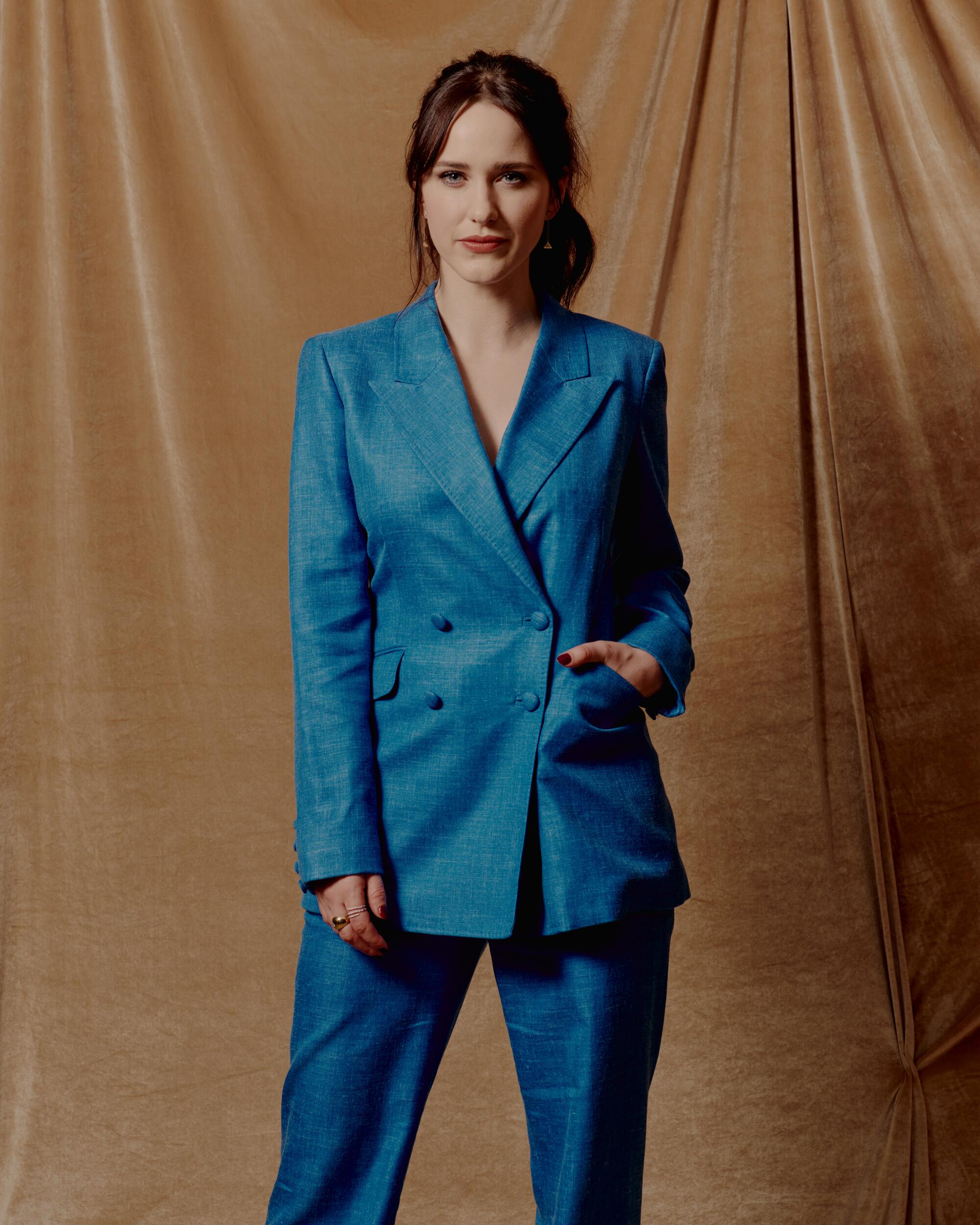
It’s been a few months since production wrapped on the show. Are you still in each other’s lives?
Brosnahan: I see Marin all the time.
Hinkle: Once she texted, “Hey, do you happen to be home?” I was like, “Yeah, why?” She’s like, “Um, do you have a dollar or two?”
Brosnahan: There’s a cash-only bagel place that makes the best bagels in the city. And I had left my wallet at home. I just came back from a trip and all I had was euros.
Shalhoub: I still can’t believe the bagel place wouldn’t take the euros.
Hinkle: And for Rachel Brosnahan. You think they’d be like, “We trust you. Take the bagels.”
Borstein: It’s New York, buddy. They don’t care.
Do you feel like your “Mrs. Maisel” characters are still in you somewhere, or do they just get packed up and put on a shelf?
Brosnahan: When you do something for this long, they become a part of you and you become a part of them. I went straight from wrapping our season into a play and playing a really different character. I discovered pretty quickly that Midge was still living in my body and my voice.
Zegen: I started a new job. And on Day 1, the director came up to me and he’s like, “You could slow it down.”
Shalhoub: [indicating Hinkle] We had the exact same thing. We worked on [the ABC series] “The Company You Keep.” The director would come over and go, “It’s OK. But can you just —” And I just couldn’t.
Zegen: I also feel like it’s not goodbye. This doesn’t come from any higher-ups or anybody. But I can’t imagine we won’t revisit these characters at some point.
Borstein: It would be a wonderful surprise. But I feel like we began, we middle-ed and we ended. I think the ending was really satisfying.
Hinkle: I want so badly to keep holding onto you guys and to hold onto Rose. I’ve never had a person I played that surprised me as much as this character I got to do. I had absolutely no idea about the extraordinary depth of this human I was going to get to be.
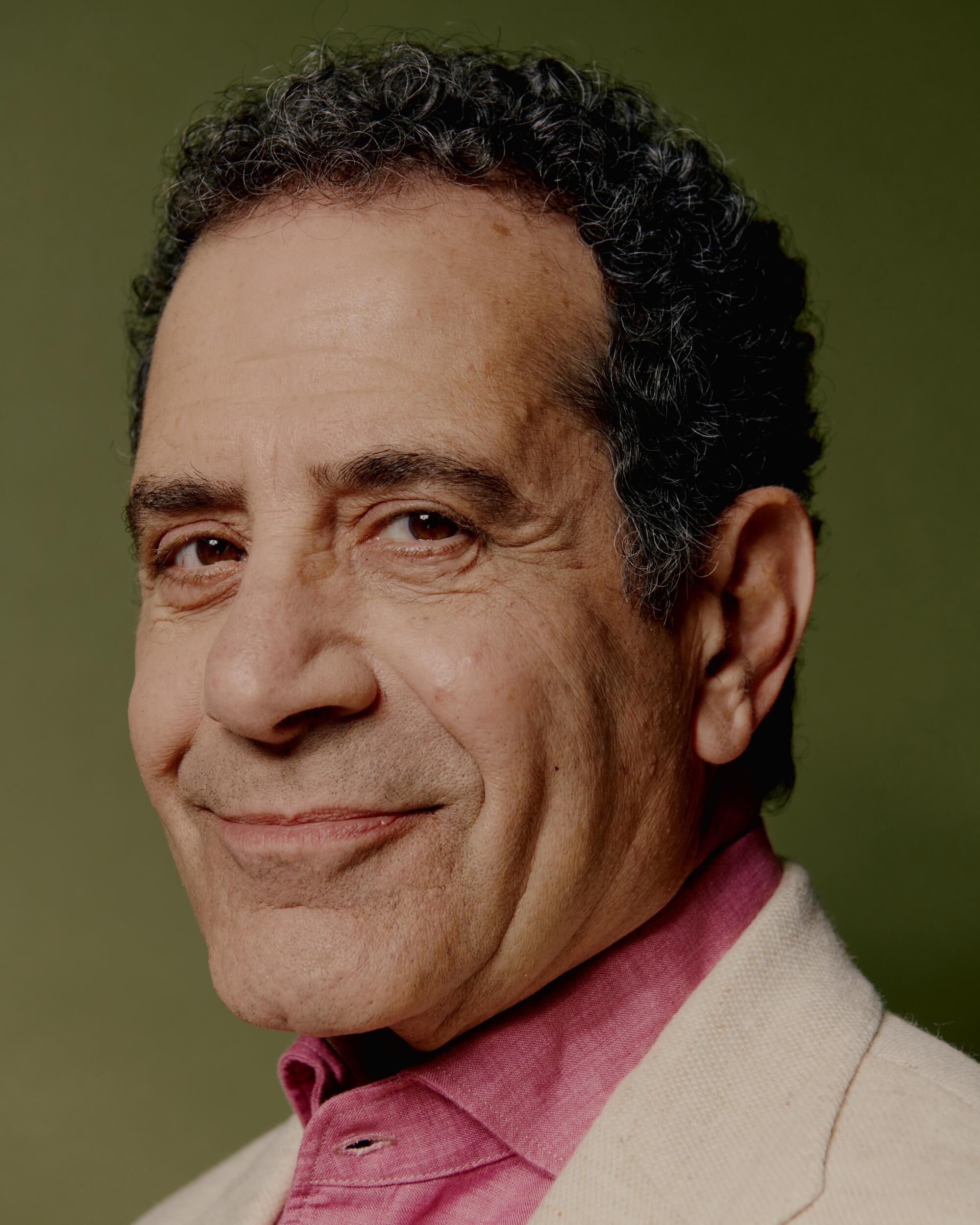
What are some of your memories from the start of the series?
Brosnahan: I remember reading the script for the first time. I had been watching Edie Falco on “Nurse Jackie.” As someone who died and cried in roles for years prior to this, I thought, well, if they want me, it must be something like “Nurse Jackie.” I could not have been more wrong. During one of our scenes in the pilot, Amy pulled me aside and was like, “I just want you to remember that it’s a comedy.” Shoot me dead. I’m just going to go jump into the Hudson River.
Zegen: My first day at work, they were shooting you [Brosnahan] opening up the oven and taking a brisket out. And I remember thinking, she’s so good. And all she did was take out a brisket. I was like, I can’t do that. She can make that look incredible.
Hinkle: So many other shows that I’ve done, there’s a lot of focus on what your face is doing. And I have a lot of self-criticism and self-loathing and I don’t even know why I became an actor. This is the first show I’ve done where I actually let go of the self-consciousness about my face because very rarely do the cameras come in close-up.
Brosnahan: There’s a direction that says “Midge plops on the couch.” And boy, did we plop. Amy kept going, “I need you to plop” and I’m like, “I’m plopping. But my husband just left me. I’m emotional.” I was like, “Feelings first.” And she was like, “But only if you plop.” After plopping about 100 times I knew this was the beginning of the greatest learning experience of my life.
Shalhoub: You should see her plop now.
Did you learn to rely on each other for support in those earliest days?
Brosnahan: I turned to Alex in a complete panic on one of my first stand-up sets and was just like, “Help. Tell me if something sucks. I’m not sensitive. Help me fix this.” And Alex turned to me and said, “I can’t help you. But just take up your space and ask for what you need.” And it was a lesson that I needed to keep learning throughout this series.
Borstein: She was kind of like —
Brosnahan: Panicked?
Borstein: — “I just don’t know if I got it. I don’t feel like I got it.” I said, “Then tell them you want another shot. You clearly know you want another one. This is your show.”
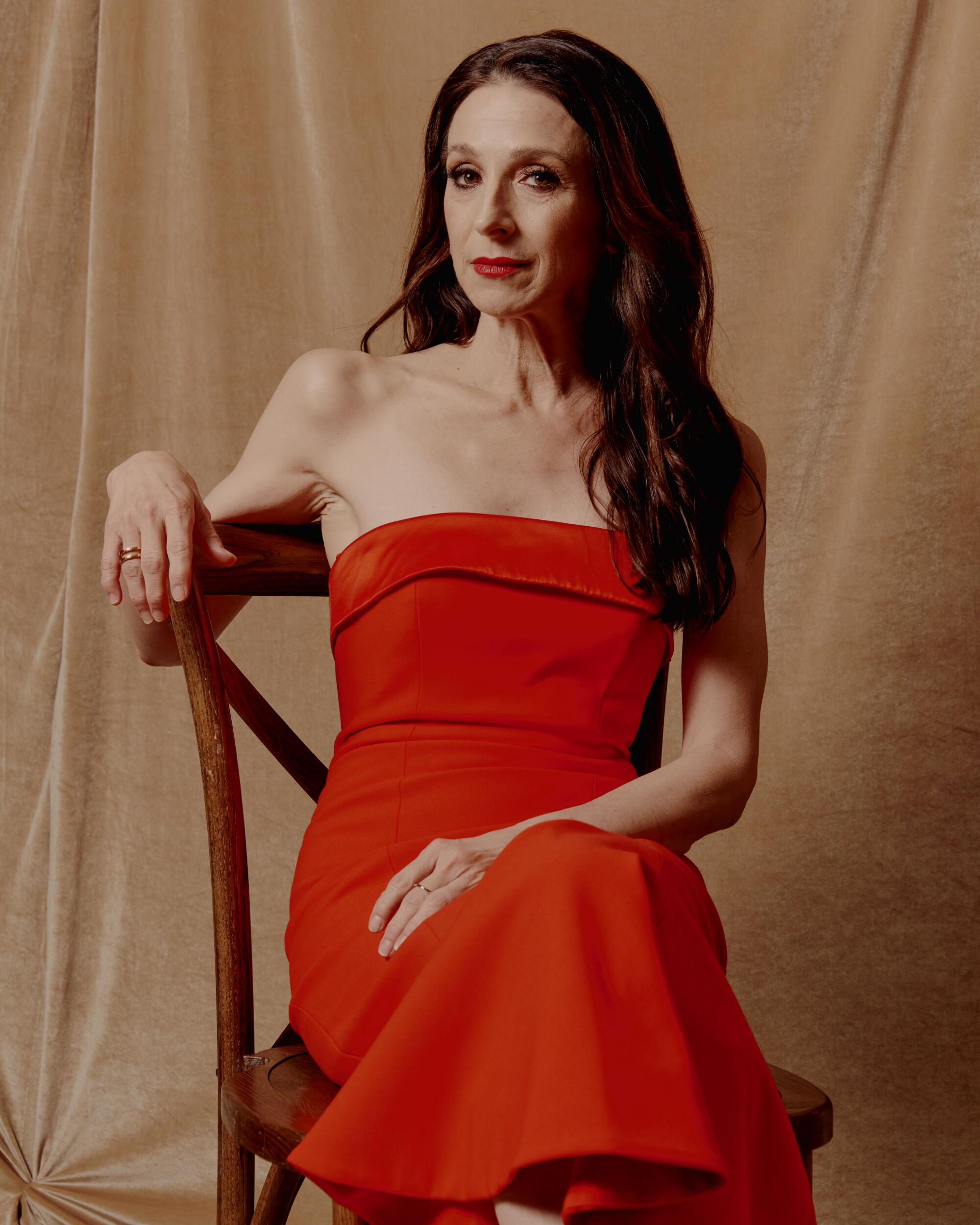
Is it common for TV shows to travel as much as “Mrs. Maisel” did?
Shalhoub: Oh no, this is more than any place. On “Monk,” they would hold out scenes from each episode and then take us to San Francisco to shoot our exterior stuff. But then about around Season 4 or so, they realized they could do it cheaper with green screen. Thank God we [on “Mrs. Maisel”] went to Paris and Miami too.
And you got to spend a summer in the Catskills.
Brosnahan: I wish that one was as glamorous as the others but we shot it in Deposit, New York.
Zegen: That was probably the most fun I think I had doing this show. That felt like summer camp.
Borstein: I had scheduled summer camp for my son in Brooklyn. And then that’s when I found out I’m not even going to be around. So I would go back and forth from Deposit, New York, to Brooklyn. It was like a three-and-a-half-hour drive. I just rented a car and went back and forth and they were like, she’s going to die.
Brosnahan: The best part about going to Deposit and Miami was that we got to bring the whole crew.
Borstein: Miami was so much fun. Except for the heat stroke and almost getting eaten by sharks.
Brosnahan: Alex and I almost got murdered in Miami, and it was our fault. We can’t go to the beach during the day, because we’re pale.
Borstein: We thought it would be cute to go to the beach at 1 a.m.
Shalhoub: But that’s when the sharks come out.
Brosnahan: We were like, we’ll just stay in the shallow end and it’ll be safe. And was the worst choice. That’s where they feed.
Shalhoub: Imagine the rewrites that would have taken.
Borstein: I got myself to Paris just to hang out with you guys. I wasn’t shooting, but I was living in Barcelona. It was like an hour flight, so I went with my kids.
Zegen: She rented us a minibus and we went out to Disneyland Paris.
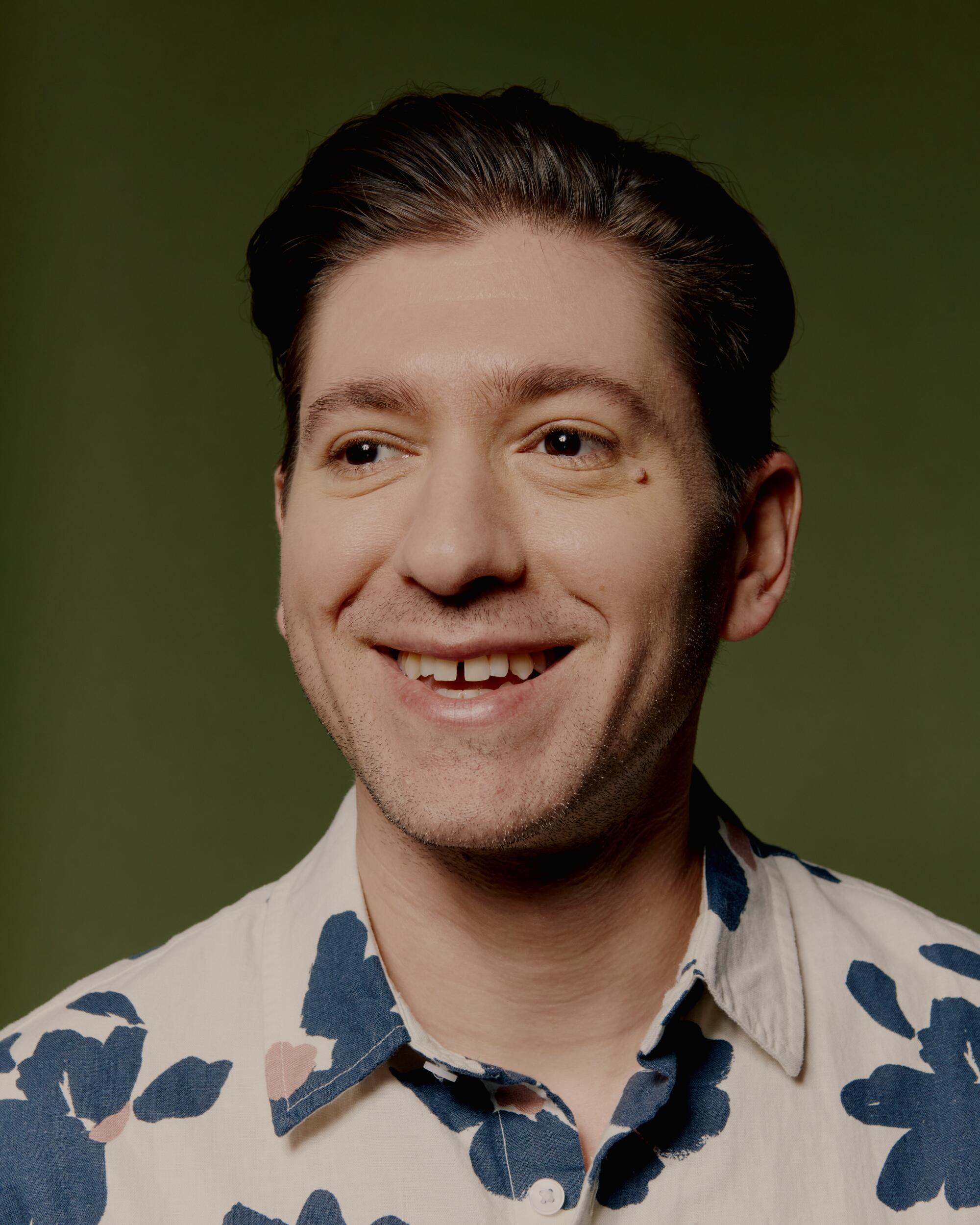
Did you feel that Amy was looking to push you out of your comfort zones as actors?
Brosnahan: I remember Amy delighting so much in any opportunity to make us uncomfortable. I got a text from Amy going, “By the way, for the opening of this new season, there’s going to be 850 background [actors]. I hope you’re OK with that.” And I was like [laughs nervously], and then she was like, “But we could reduce it to 250 for your close-up if you want.”
Borstein: That was a nightmare. That was the one my alarm didn’t wake me up. The set was an hour from where I was. Amy was worried because I wasn’t answering my phone and she was like, “I think she killed herself.” And I was in tears panicking because I knew there’s 800 extras waiting. Somehow it was a miracle I got there — you guys ran a little bit late and the second I got there they just put me in the scene.
How did it feel to then go out and perform for that crowd?
Brosnahan: It was unlike anything I’ve ever experienced. It must be what it feels like to be a rock star. I’ve never heard that volume of laughter roll through a space before. I wanted to bottle that experience for when I have a bad day in the future.
What do you recall about your last day of work on the series?
Brosnahan: Alex and I couldn’t look at each other.
Borstein: Amy did the really brilliant thing of saving scenes for the end that were an ensemble so we could all be together. I was like, “No big deal. Whatever. Things end. It’s fine.” I get on the set, and I was like [weeping], “There’s something in my throat.”
Zegen: We wrapped at like 4 a.m. And there were streamers and confetti and Champagne and a lot of tears.
Brosnahan: The scene that we saved for last, there is no acting involved in that scene from any of us.
Borstein: We can tell them. Rachel’s character dies.
Brosnahan: You’re talking to my ghost. I committed [to it]. But we had it on the first take. And Amy kept going, “Again.” “Again.” “Again.” And I kept going, “Is there anything you want us to try?” But she kept going, “Let’s just do it again.” At some point everyone was going, “Oh my God, she’s not ready.”
Shalhoub: She couldn’t say “Cut.”
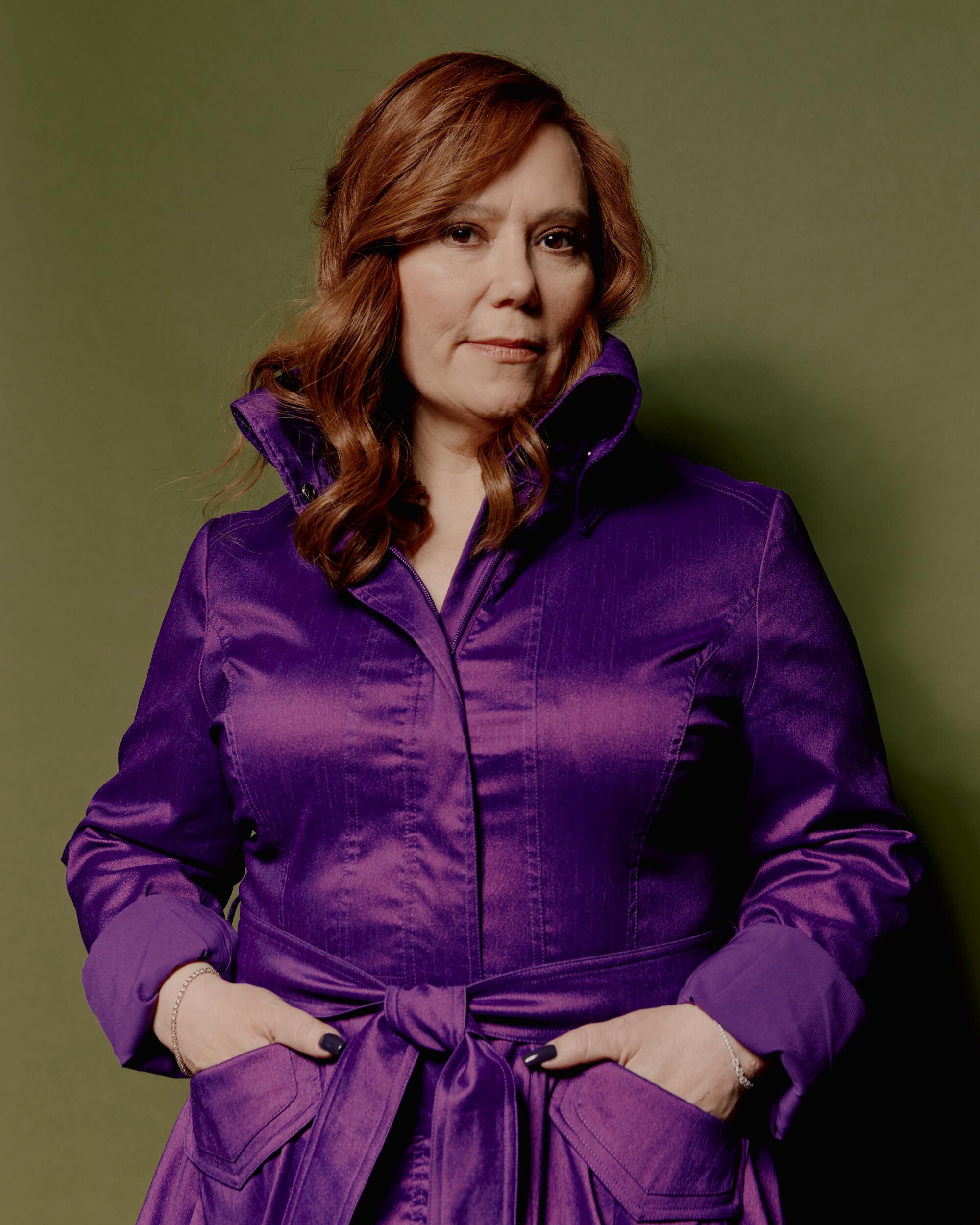
What will you miss most about “Mrs. Maisel”?
Borstein: We were all treated so well. And I don’t mean fancy or over the top, just with respect. A lot of show creators don’t like actors and [here] they love ‘em.
Brosnahan: And they press you to be better. They also don’t accept something that’s beneath you. And they know it. They know the places that we haven’t yet pushed ourselves into and they won’t accept anything less than us reaching as high as we can.
Borstein: I’m going to miss getting a random text during hiatus [as they prepped for the following season] saying, “Hey, can you ice skate?”
Hinkle: “Do you speak French?”
Brosnahan: “Can you ride a bike?”
Zegen: “Can you hit a baseball?”
Shalhoub: “Are you allergic to tomato juice?”
More to Read
From the Oscars to the Emmys.
Get the Envelope newsletter for exclusive awards season coverage, behind-the-scenes stories from the Envelope podcast and columnist Glenn Whipp’s must-read analysis.
You may occasionally receive promotional content from the Los Angeles Times.










